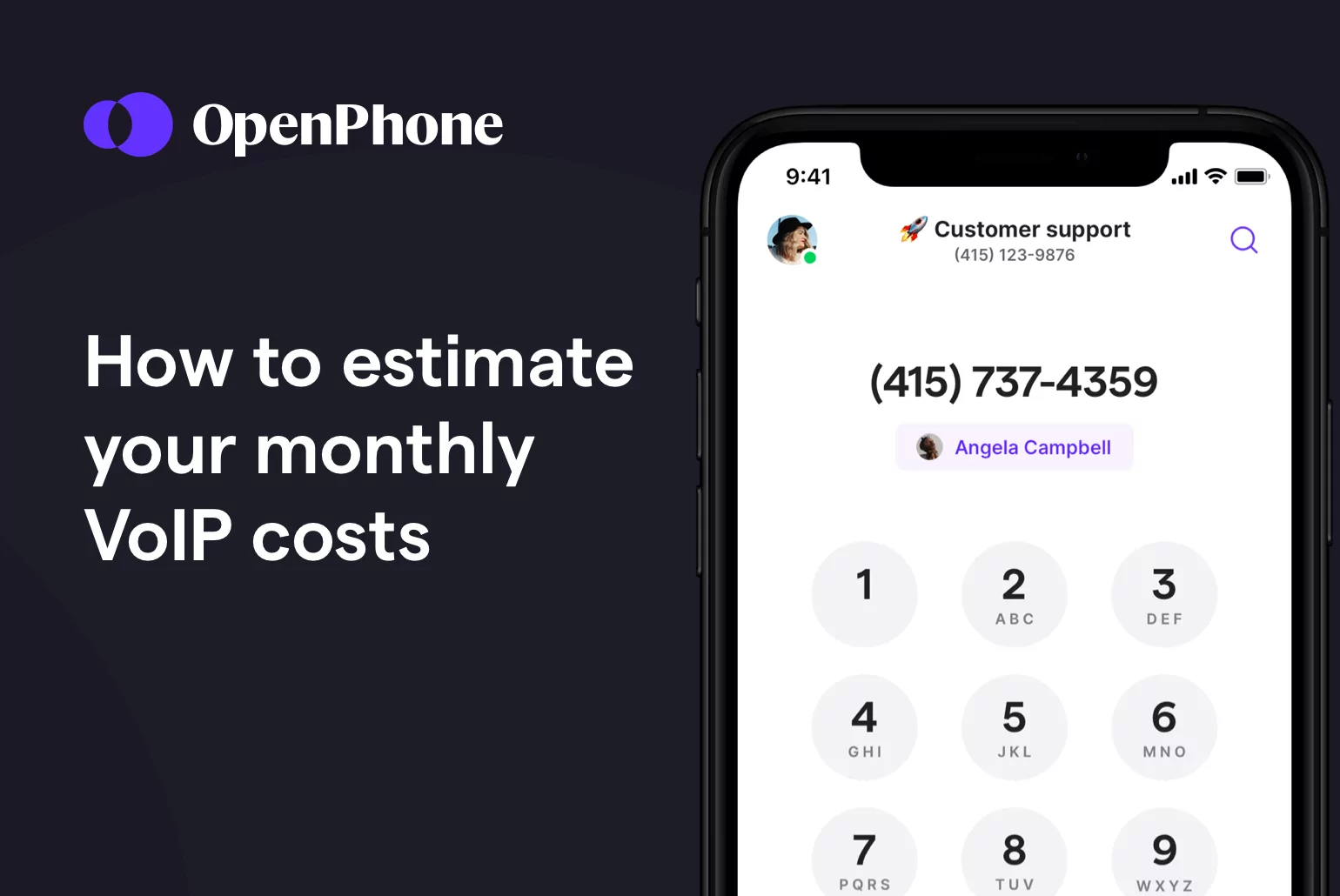If you’ve been considering taking the leap to Voice over IP (VoIP) for your business, now is a great time. But being the savvy entrepreneur you are, you’re likely considering the costs you’ll need to pay to smoothly incorporate VoIP service into your daily operations.
Like any purchase, pricing will depend on several factors, like the provider you choose, the features and functionality you need, the type of hosting you’ll use, and any extra hardware or service upgrades you might want.
In this article, we’ll look in detail at all of the cost considerations for switching your business communications to VoIP. By the time you’re done, you’ll have a strong idea of your VoIP cost and how much you’ll need to set aside for the service.
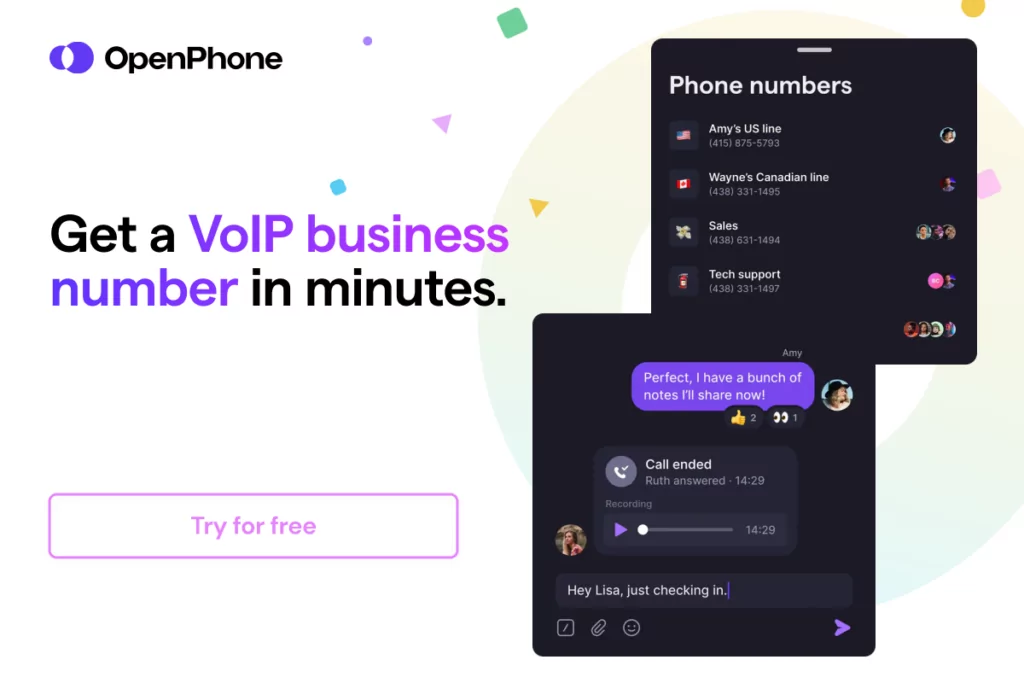
How much does VoIP cost?
A VoIP phone system, also known as a virtual phone system or cloud phone system, typically costs between $15 to $40 per month per user, with pricing on the higher side for enterprise and more customized VoIP solutions. Some providers charge based on usage, such as the number of minutes and extensions your team requires. Additionally, factor in any new hardware you need to purchase in addition to the monthly plan fee.
Wondering what all this might add up to? It depends on the provider. Let’s say you’re a 5-person team requiring unlimited minutes and a separate phone number for each user along with a main office number (giving you six numbers). With OpenPhone, here’s how much you would spend monthly on our Starer plan:
| Item | Amount Required | Upfront Cost | Total |
|---|---|---|---|
| OpenPhone Standard Plan | 5 users | $15 per user (billed annually) | 65 |
| Calling & Messaging | Unlimited | Free to US & Canadian numbers | Free |
| Phone numbers | 1 | 1 phone number included with each user1 additional numbers = $5 per month | $5 |
| Softphone | OpenPhone app is free with your subscription | Free | |
| Total upfront cost | $70 |
As the total indicates, it’ll only cost you $55 a month to equip your whole team with a VoIP business phone system and to have six total numbers. In our experience, that’s nothing compared to what an on-site PBX costs to provide the same functions. (For a traditional PBX system with five phone lines, companies end up paying an average of over $4,000 for installation and maintenance. You do the math.)
With top business VoIP systems like OpenPhone, you also get advanced features that you won’t find with traditional PBX. Here are just a few of them:
- One-click call: Call virtually anyone with a single click or tap — punching in 10-digit numbers is now a thing of the past.
- Keyboard shortcuts: Quickly navigate your VoIP app with easy-to-remember keyboard shortcuts.
- Voicemail-to-text transcription: Check your voicemail with ease, having it automatically transcribed and displayed to you as text.
- Snippets and auto-replies: Create templates for common inquiries so you can get back to your customers faster. And save time. (Win-win!)
- Local and toll-free numbers: Help customers and prospects reach your business without footing the bill for long-distance calls.
- Reporting and analytics: Get insight into call and text volumes, the busiest hours of the week for phone communication, and more (Available on our Business plan).
- Integration with business software: Leverage your current CRM and all the other tools you already use to conduct your business.
- Logins from any device: Eliminate the need to switch devices while you’re working. Get the freedom to use your computer, tablet, or phone — whichever is most convenient at that time. All you need is WiFi.
Factors that can affect your VoIP implementation costs
VoIP is much cheaper to implement than traditional PBX because VoIP phone systems route calls through your internet connection, helping you dodge some seriously hefty fees. Simply download a VoIP provider’s app on any internet-enabled device and get your virtual phone system set up within minutes.
Knowing your true VoIP implementation costs requires considering a few more factors.
How much does it cost to port your number?
If you or your team wants to keep their existing phone numbers, you’ll want to ask your potential provider whether they charge to port your number to their system.
Most VoIP providers don’t have porting fees, but some providers charge to port multiple numbers (Dialpad for example — we don’t). Phone number porting can cost anywhere from nothing to $30 per number, depending on the VoIP service.
Note: With most VoIP services, you’ll be able to use your phone number during the porting process. Just make sure not to cancel the service with your original provider while the port is happening. That might interrupt the port. Wait until the port date on which your number will move to your new carrier before ending your current service.
What upfront installation costs can you expect?
With on-premise hosted phone systems, you have many upfront expenses, including software, server hardware, desk phones, and any associated installation costs. You also will end up spending thousands of dollars on maintenance, repair, and ongoing IT support.
Opening up a second office? Setting up on-premise PBX phones in different locations can double or more your initial expenses (and may even force you to hire an IT pro to troubleshoot any issues and help with maintenance).
Another thing to keep in mind: Traditional phone systems require copper wiring if you wish to add additional lines to an existing system. If your company moves premises or you decide to expand your team, the cost of extra wiring could leave you picking up a substantial bill for business phone installation.
Cloud VoIP phone systems like OpenPhone alleviate the cost for your business. With OpenPhone, all you need to do is sign up and activate your account. You don’t need to purchase additional hardware (unless you prefer having a VoIP headset), as the cloud phone system works on any computer or smart device. From there, you can easily manage your phone settings without needing to hire an IT person. Customer support is readily available with the best small business phone systems if you have any questions.
And if you want additional lines, you can virtually add them to your OpenPhone account for just $5 per month each. You won’t have to worry about copper wires or complicated equipment. Cloud phone lines are wireless and can be instantly configured over the internet.
VoIP cost calculator
You can also share phone numbers, which allows multiple team members to call and text from a single phone line — perfect if you’re a startup or small business.
Looking to calculate your estimated month one costs? Use the calculator below.
Factors that can affect your monthly VoIP costs
One of the biggest things most folks look at is the monthly price they see on the pricing page for most Voice over IP providers. There are a few other factors that are still far more cost effective than traditional carriers and desk phones. Keep these in mind as you budget for your VoIP costs.
How much does international calling cost?
If you make frequent calls overseas, switching to a VoIP provider will slash your phone bill with lower long-distance rates than landlines. While prices vary across different providers, many VoIP services support free unlimited calling and texting to any US number and in some cases even Canadian phone numbers. Calls and messages elsewhere are considered international but are available to dial at lower rates than landline phones and cellular carriers.
For non-VoIP users, calling and texting internationally means paying standard cell carrier rates. Your costs will literally increase by the minute or message(and by a lot). If we take AT&T’s basic rate for calling China, for instance, just a 10-minute call would cost you $50. VoIP providers like OpenPhone tend to offer far lower global call rates, starting at just a couple cents per minute. Doesn’t that just make more sense?
How many users and numbers do you need?
Many VoIP providers charge based on the number of users you have. However, if you’re scaling your team, you’ll want to avoid providers that require you to upgrade to a higher tier plan based on specific conditions. Some providers will make you upgrade once your team has a specific number of users — or more than one physical location. OpenPhone is accessible and scalable as you can easily add teammates to your workspace.
VoIP service costs may also vary depending on the phone numbers required for each user. Some providers include one number with each user, and any additional number exceeding your team’s total active users is charged a fixed amount per month (with us, it’s $5 per month). Others charge extra depending on whether you choose a local vs toll-free number. Using OpenPhone, you can get a local or toll-free number for each user you have without footing the bill for what’s best for business.
Does the provider have call-minute plans?
Anyone else experienced bill shock on their monthly cell phone plan? With a VoIP solution, you can get a lot more call minutes than with a landline or cell phone carrier. However, some providers charge extra for this, meaning you must tread carefully with making or receiving calls on your virtual telephone system. For instance, some providers make you pay for toll-free minutes.
OpenPhone is a feature-rich platform that offers unlimited call minutes to US or Canadian numbers, so you don’t have to worry about incurring excessive charges. And no toll-free minute plans are required.
How much support can you expect?
With on-premise hosted systems, you usually need an IT team (or at least one expert) to assist with troubleshooting and maintenance. Whether you hire full-time or on a contract basis, you’re looking at thousands of dollars in business phone costs. Want to upgrade or upgrade your PBX software? Prepare to spend a couple hundred more on on-premise tech help.
VoIP phone systems eliminate the need for an in-house IT team. Many VoIP providers offer 24/7 customer service to help you troubleshoot specific issues — but as a replacement, you want a provider that doesn’t have long wait times or an enormous backlog of tickets to address. You can verify the quality of a VoIP provider’s platform and support on sites like G2 and Capterra — both feature reviews from real-life customers.
OpenPhone is proud to be known for its stellar customer service. See for yourself why OpenPhone is rated the #1 business phone platform on G2 with reviews like this:
“The features are great. The interface and ability to share with your team is a huge plus. Easy to setup, easy to use. Customer service response is great. OpenPhone even offers training on how to get the most out of their system for your particular case. The cost model is also very affordable compared to the competition. I left another service to switch to OpenPhone.” (G2)
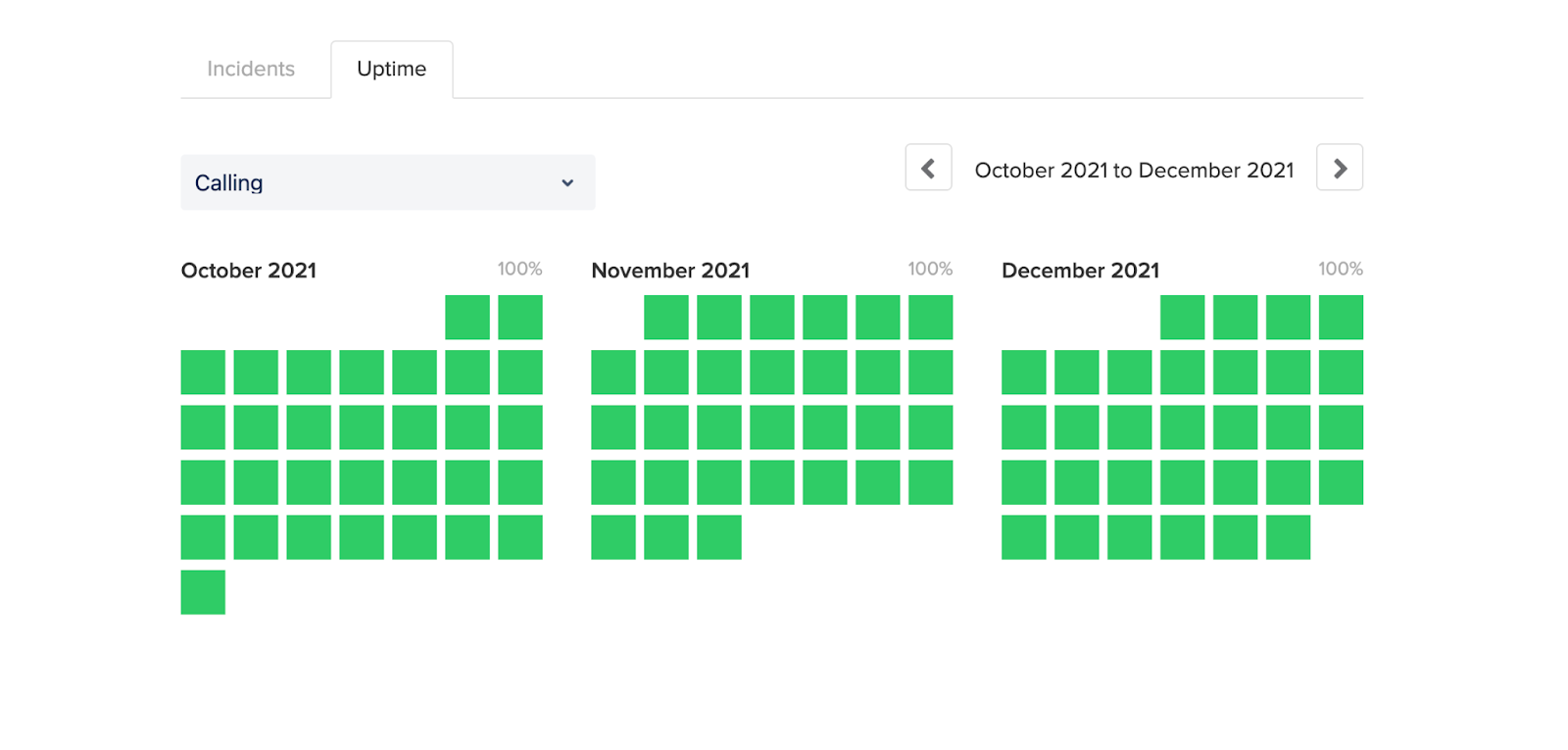
Equally important, OpenPhone’s VoIP service is highly reliable with a strong uptime history.
What subscription plans are available?
When comparing VoIP providers, you’ll want to take a closer look at how they’ve structured their subscription plans.
Some VoIP providers offer you a discount if you sign up annually instead of monthly. Others may offer no-contract plans but charge a higher monthly fee for their services.
OpenPhone keeps things flexible — we charge $15 per month with our annual Starter plan and $19 per month on the monthly Starter plan. To help your team deliver an even better call and text messaging experience to your team and business connections, we also offer our Business plan starting at $23 per month annually (or $33 monthly). Our subscription plans are not only affordable for small teams, but you definitely won’t pay more just because you want to test the waters before making a long-term commitment with a VoIP provider.
You can even try out with a temporary number for seven days by signing up for a free trial.
Will you need to dedicate more resources to your phone system?
On-premise hosted phone systems require businesses to hire technicians to support their systems. With some configurations, you also need human operators to manually answer calls and connect callers to the correct departments or people. Given the expense of adding these resources, companies look into cost-effective modern phone solutions such as VoIP.
Cloud-hosted VoIP systems come equipped with functions that provide a ton of cost savings. With a VoIP service, you can manage your entire phone system from anywhere you prefer and don’t need to employ additional IT resources.
Additionally, leading VoIP providers like OpenPhone let you set up an auto-attendant (virtual receptionist), allowing callers to select where they want their call routed using their phone’s keypad (i.e., dialing 1 for English support and 2 for service in Spanish). Using an automatic switching system helps you save cash and office space.
Should you get a VoIP-specific phone?
Most VoIP phone services will work on a computer or mobile device, but if your employees feel more comfortable calling clients from their desks, you might consider a VoIP phone like a Desk IP phone.
Desk IP phones work similar to analog desk phones, except that they have the ability to connect to the internet for VoIP functionality. The typical costs for these special handsets are $150 to $200 per phone. Installation and configuration costs an extra $30 to $50 per phone. If you have a large team of, let’s say, 20 people, you’re looking at around $6,000 in VoIP phone costs.
Opting for a software solution is much cheaper. Installing OpenPhone’s softphone software is quick and easy, making it a better alternative to desk IP phones for VoIP telephony.
5 key VoIP features most businesses require
When looking for the right Voice over IP solution, there are a few key things that business owners will need to help improve and streamline their phone operations. Look for these key features.
1. Call and text from any device
Because VoIP service is assigned to a virtual phone number and not a specific device, you can connect everything from computers to tablets to mobile phones. You have the added benefit of being able to send and receive SMS and MMS messages in addition to making calls. Just think of your favorite online messaging services — but for your phone line.

You may be wondering how this works if your team brings their own devices — in particular mobile phones. Teams can easily add the second number to their cell phone. Plus, easily see when incoming calls are for work or from a personal contact.
2. Easy system setup and management
Some business owners never even try using a VoIP service because they expect it to be a headache to set up and manage. The truth is, a good service will make this process as simple and frictionless as possible. Look for a VoIP provider that makes it easy to customize your business phone settings. From naming your inbox to adding auto-replies to specifying your outgoing caller ID, you’ll be able to set up your ideal experience and workspace in a few simple steps.
3. Integrations
A business is an ecosystem of tools and systems. Your VoIP should integrate smoothly into that ecosystem, helping to save time, automate the mundane tasks, and keep you and your team focused on your “bigger picture” goals. Look for a VoIP that integrates with the modern tools that keep your business organized and connected, like Slack, Zapier, HubSpot.
4. Call recordings
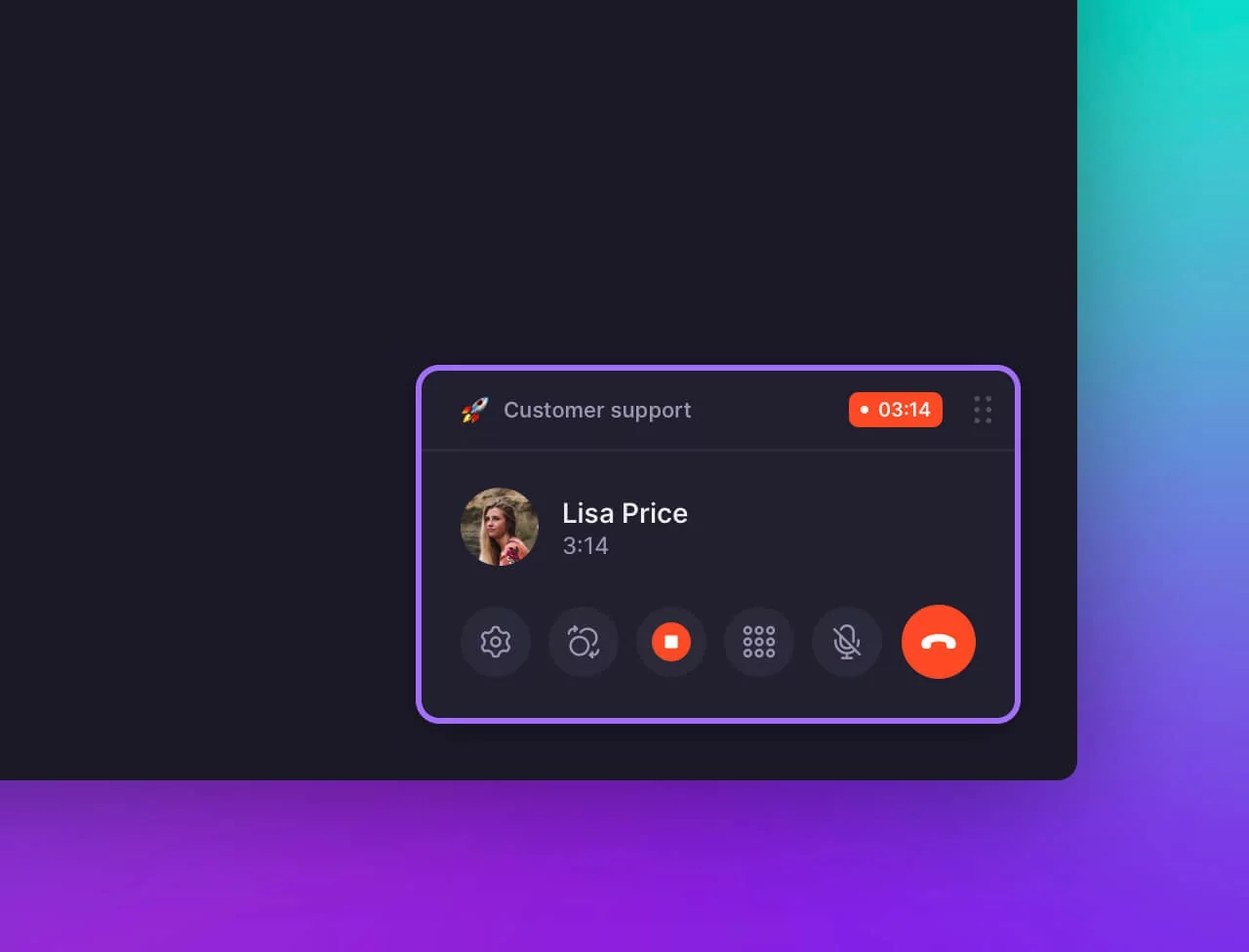
Businesses can reap significant benefits from recording internal conference calls, customer support conversations, sales discussions, and more. The best VoIP services will let you legally record phone calls in just a click, so you can document important calls and easily retrieve recordings as needed.
5. Reliable customer service
Nobody likes to be on hold for hours — or worse, submit a ticket that you don’t hear back on for days or even weeks. Top Voice over IP providers offer responsive and reliable customer service and a robust knowledge base for self-service troubleshooting. These resources help you stay confident that you can expect a resolution in a timely manner if any issues arise.
This depends on your current internet plan. According to the Federal Communications Commission (FCC), you should have a minimum of 0.5 Mbps download speed for VoIP to function smoothly. Try a VoIP speed test to see if you need an upgrade.
If you already have an internet connection, the answer is typically yes. Voice-over IP services doesn’t require a new system or additional hardware like a landline does, helping save you money. But of course, your pricing may be higher depending on the features you need for your business.
VoIP providers bill the same way many other service providers bill: a monthly or annual bill that can be paid online through your customer portal. In many cases, you’ll add your payment information when you sign up, and your payment will be automatically deducted from your account each month (or year, depending on your preference).
With many VoIP providers, pricing for domestic calling and messaging comes with your monthly (or annual) subscription cost. If you plan to add international calling, the cost will increase depending on the countries you’re calling or messaging. For example, calls to Spain from the US might cost between $0.03 and $0.80 per minute.
This can vary by provider. Some providers charge extra for you to have a toll-free number. Providers like OpenPhone don’t. One toll-free or local number comes with your monthly (or annual) subscription. OpenPhone’s VoIP pricing is $5 per month for each additional number, whether it’s toll-free or local.
Get the most business-friendly phone solution with OpenPhone
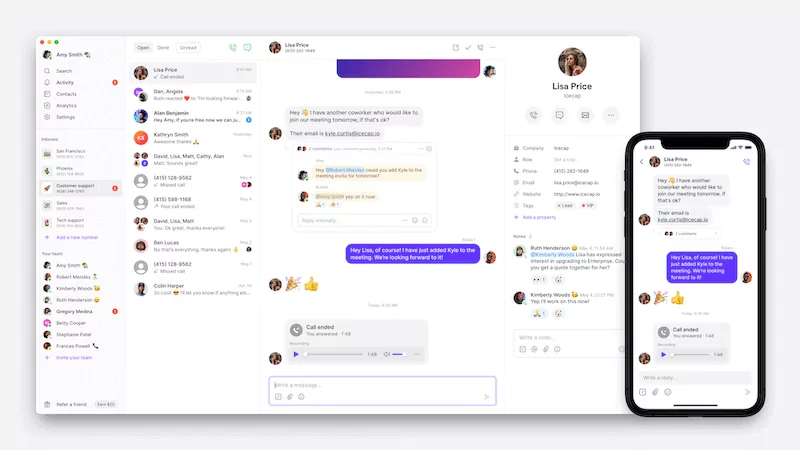
Remember all the potential cost savings we listed above? Well, those are all attainable with OpenPhone. Our plans start at $15 per user per month — and you won’t be forced to upgrade to a higher-tier plan just because your team expands. Enjoy transparent pricing and all the business phone features you need as your company grows. Check out OpenPhone with a free trial and see how you can be up and running with Voice over IP in minutes!
